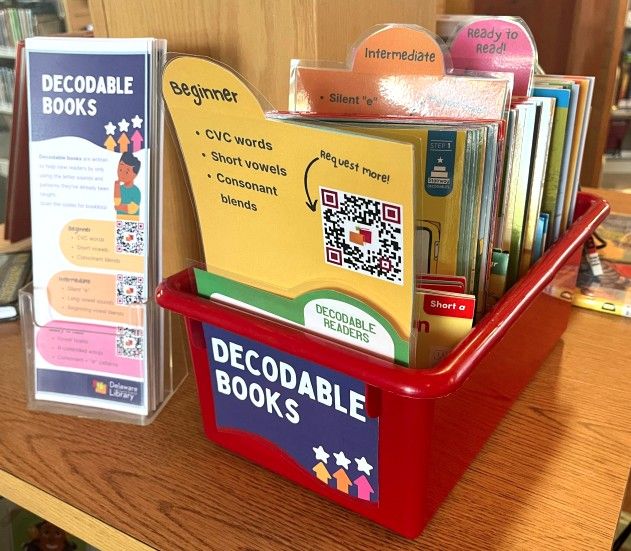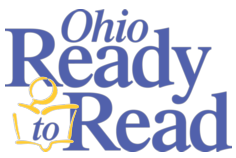
The term "science of reading" refers to an interdisciplinary body of scientific evidence that:
- Informs how students learn to read and write proficiently.
- Indicates that all students benefit from explicit and systematic instruction in phonemic awareness, phonics, vocabulary, fluency, comprehension, and writing to become effective readers.
- Explains why some students have difficulty with reading and writing.
- Does not rely on any model of teaching students to read based on meaning, structure and syntax, and visual cues.
House Bill (HB) 33 of the 135th Ohio General Assembly mandates a shift in school curriculum, teacher training, and reading intervention approaches. See ReadOhio on the Ohio Department of Education and Workforce (ODEW) website.
These resources will assist library staff with learning about the science of reading and supporting children and families through storytimes, children's programs, and library collections.
Science of reading webinars, videos, and online courses:
- The Ohio Library Council hosted a three-part Science of Reading webinar series (scroll down to Science of Reading) in spring 2024 with the ODEW. Viewers will gain a better understanding of the shift to the science of reading in Ohio’s schools and how public libraries can help support the changes in classroom reading instruction. There is a $30 viewing fee for non-OLC members.
- The Science of Reading: You Don't Have to be a Scientist to Understand It is a webinar recorded in March 2024 by Northeast Ohio Regional Library System (NEO-RLS). Presenter Julia Shaheen, Literacy Manager at Stark Library in Ohio, focuses on what the science of reading actually tells us about how children learn to read, Ohio’s plan, and what it all means for libraries. There is a sliding access fee of $0-20 depending on NEO-RLS membership status.
- ABCs of Reading Development is a freely available recorded webinar hosted by the Massachusetts Library System for public library workers. Presenter Julie Bertram covers the Simple View of Reading and development of listening, speaking, phonological awareness, reading, and writing skills in early childhood. She also discusses leveled text through the lens of the experiences of emergent and struggling readers.
- Learning to Read at School, Loving to Read at the Library is a freely available recorded webinar hosted by the Colorado State Library for public library workers. Presenter Jess Hesselberg connects public library resources and practices to the science of reading and discusses how public librarians support reading instruction.
- Text Types and Evaluating Beginning Reading for Librarians and Library Staff is a freely available recorded webinar from Teach My Kid to Read. Presenter Laura Lay explains decodable books and shows how to evaluate beginning readers to determine if they are phonics-based.
- Foundations of Literacy: The Science of Reading is a freely available recorded webinar from LENA featuring a panel of educators describing how foundational oral language and literacy skills build to a child's success in learning how to read.
- The ODEW offers a 45-minute course on the science of reading that guides participants in recognizing and explaining the aspects of science of reading and enhances their comprehension of successful approaches to literacy instruction. The course includes a short video, resources, reflection questions, and articles that provide practical steps to improve literacy instruction.
- Governor DeWine has posted an 8-minute video that explains science of reading and highlights successful approaches in several Ohio schools.
- The ODEW's “All Students Can Read” instructional series aims to enhance the knowledge and skills of special educators, using research and theoretical models to support reading science, assessment, and instruction.
Toolkits, articles, and websites:
- The Urban Libraries Council's Science of Reading Toolkit is designed to help public libraries prioritize equity, understand the science of reading, design community-focused programs, embed structured literacy elements, and measure program outcomes. It is brief (11 pages) and useful for libraries of all sizes.
- Reading in the balance: Exploring the role of the public library in the ‘science of reading’ from WebJunction includes an overview of the science of reading, a well-curated collection of resources and articles, and recommendations for public library practitioners.
- Every Child Ready to Read and the Science of Reading from the ALSC blog
- What Are Decodable Books? from the Ohio Statewide Family Engagement Center provides a helpful overview for families on how to identify and use decodable books. The content of this page is also available as a downloadable PDF that you can print and distribute to families.
- Ohio’s Phonics Rule outlines the requirements for teaching phonics. Explicit and Systematic Phonics Instruction is an ODEW Literacy on Demand course that provides helpful strategies, resources and practices in teaching phonics.
- Ohio’s Plan to Raise Literacy Achievement is a guide to evidence-based language and literacy teaching and learning for all learners from birth through grade 12. This plan articulates a state literacy framework aimed at promoting proficiency in reading, writing and communication for all learners.
- What is the Science of Reading? by Dr. Timothy Shanahan on Reading Rockets
- "Why more U.S. schools are embracing a new ‘science of reading'" by Heather Hollingsworth, Associated Press on PBS News Hour
Ohio Ready to Read is indebted to the Ohio Library Council for source material from OLC's Science of Reading guide.
